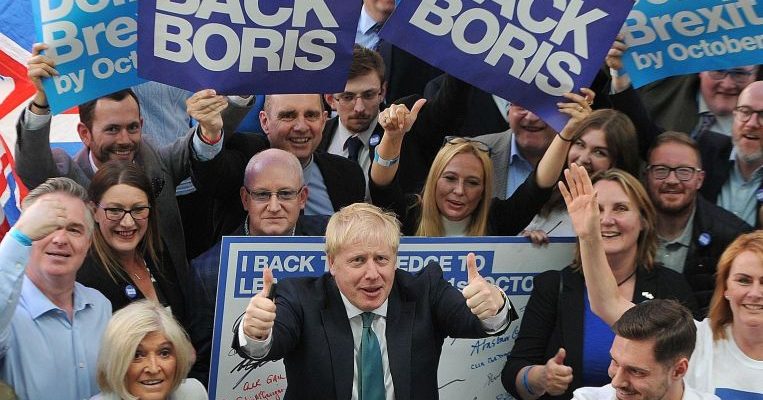
LONDON • Mr Boris Johnson looks set for a landslide victory over rival Jeremy Hunt in the race to become Britain’s next prime minister.
A YouGov poll published in The Times newspaper says Mr Johnson is backed by 74 per cent of Conservative Party members, with Mr Hunt languishing on 26 per cent.
The survey suggests that the vast majority of the 160,000 grassroots party members, who will receive their ballot papers this weekend, do not believe Mr Hunt’s claim that he is prepared to take Britain out of the European Union without a deal.
Only 27 per cent think Mr Hunt would do so, compared with 90 per cent for Mr Johnson.
In an interview with The Times, Mr Hunt sought to play down perceptions that Mr Johnson’s status as the Brexit referendum’s poster child would influence the outcome of the vote.
Preparing for an exit without an agreement with Brussels is key, Mr Hunt said, adding that the best way to deliver Brexit would be to do so with an accord.
“The choice on this election isn’t actually between our approach to no-deal, it’s who is the candidate who is most likely to negotiate a deal so that we don’t have those difficult decisions to take,” he said.
In an interview with the Daily Mail, Mr Johnson responded to a question on what he would do if, by the Oct 31 Brexit deadline, the EU refuses to reopen the Withdrawal Agreement and Parliament blocks a no-deal exit, saying it would not happen “in a month of Sundays”.
Brexit has become an “existential” issue for the Conservative and opposition Labour parties, so they need to “move on and get it done”, the paper quoted him as saying.
Prime Minister Theresa May will leave her job later this month, having failed three times to secure parliamentary backing for her Withdrawal Agreement with the EU. The main sticking point was concern over the Irish “backstop”, an insurance policy to prevent having border controls on the island of Ireland by tying the UK to EU rules until a new trade deal was reached.
Eliminating a hard border between Northern Ireland, which is part of the United Kingdom, and Ireland and providing frictionless trade was a crucial part of a 1998 peace deal that ended three decades of sectarian violence.
In the Daily Mail interview, Mr Johnson also sought to buttress his law and order credentials with a commitment to ensure that serious sexual or violent offenders serve out their full sentences rather than being released at the halfway point, as at present.
Restrictions on stop-and-search, put in place by Mrs May when she was home secretary, should be dumped, he said.
The new prime minister is expected to be announced – and take office – during the week of July 22.
The two finalists in the race to succeed Mrs May are now rallying support at hustings across the UK, and were on Friday wooing voters in Scotland where Mr Johnson’s “no-deal Brexit” threats are fanning the flames of independence.
Scotland has been traditional tricky terrain for Britain’s governing Conservative Party, which has not topped a British general election there since the 1950s.
Mr Johnson and Mr Hunt held a hustings meeting in Perth, a city in central Scotland – the latest leg of a month-long contest which will conclude with one of them being appointed Britain’s next prime minister on July 24.
But stealing a march on Mr Johnson, Mr Hunt visited Scotland last month and has secured the endorsement of the Scottish Conservatives’ leader Ruth Davidson, who is wary of the prospects of Britain splitting away from the EU without any plans for what happens next.
Separately, the BBC yesterday reported that some Tory members have been issued with two ballot papers to vote for the party’s next leader, citing a party insider as estimating that more than 1,000 people could be affected.
It said that, in some cases, this was because members live and work in different constituencies and may have joined the Conservative associations in both areas.
Party chairman Brandon Lewis said that, nevertheless, people would be able to vote only once.
BLOOMBERG, REUTERS
